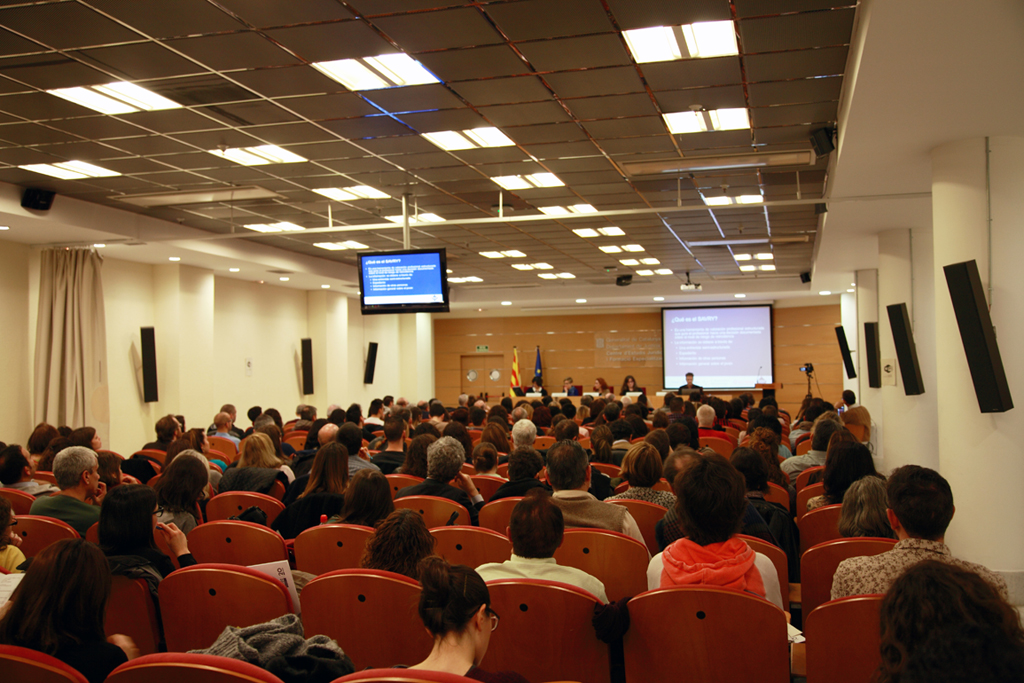School are vital in the fight against juvenile delinquency
Official figures indicate that juvenile delinquency in Spain has dropped in recent years. But at the same time it has changed, adopting forms and posing new challenges, which are not exactly easy to deal with. This is one of the main conclusions of the 6th Conference on Criminology organized jointly by the Universitat Oberta de Catalunya (UOC) and the Centre for Legal Studies and Specialized Training (CEJFE), which this year was entitled "Criminology faced with juvenile delinquency and its new forms".
Researchers and professionals have analysed the delinquency of youths from different perspectives, both aggressors and victims, with both a latent and clear conclusion: education has a fundamental role and the involvement of the school is increasingly more necessary to fight the new and diverse faces of the phenomenon today, with the internet and new technologies as the background. "Schools have a lot of ground to cover and we must all be aware of it," explains Josep Maria Tamarit, Director of the UOC Bachelor's Degree in Criminology.
With a Doctor of Psychology from the Universitat de València, Irene Montiel has provided data that is clear and worrying in equal measure, based on a study with teenage students in the Autonomous Community of Valencia: 48% of minors attending school aged between 13 and 17 admit they have been an aggressor (committing cyberbullying, invading the privacy of others, distributing sexual contents or sexually coercing classmates) via the internet on at least one occasion. Moreover, 78% of aggressors admit they have also been victims of internet aggressions, in most cases on more than one occasion. "These aggressions are still fairly unknown to us and go far beyond cyberbullying; they are the great challenge of juvenile violence and we must keep in mind that schools are one step behind because the changes are fast and so we must begin training educators in this direction as soon as possible to avoid criminality in cyberspace," Montiel stressed, noting that now is not the time to miss the train of good practices developed in recent years and that are now beginning to have positive effects. And she has given us an idea of how to go about it: "Prohibiting the internet is not the solution; we must teach people how to use it."
For Tamarit, "it is highly significant that so far this century conventional property crime has dropped greatly while the phenomenon of cyber-victimization on a large scale has emerged." He argues that this shows that "the use of the internet by young people produces changes in how they relate with others and the world, in the opportunities to commit an offence and in their motivations and needs."
"Youths must be motivated at home and at school"
Martin Killias, Permanent Visiting Professor for Criminal Law, Criminal Procedural Law and Criminology at the University of Saint Gallen (Switzerland), has presented the partial results of a wide-ranging study on juvenile delinquency and its causes in Switzerland and in other European countries. He has explained that any interpretation of the results obtained in this study indicates that "the school, friends, family and unstructured management of leisure time, a period that is often filled by extra-curricular activities, are decisive factors for managing and containing young people's criminal behaviour," whether inside or outside cyberspace. And he added that "happiness is the best indicator: a teenager who is happy with what he is doing and his life will commit fewer offences; therefore, young people must be motivated, no matter how, above all at home and at school".
Ed Hilterman, course instructor in Criminology at the UOC, has emphasized the differences between teenage boys and girls who have committed offences and have been through the juvenile justice system. "The system, as it is organized, does not provide for gender differences in the necessary interventions and, in contrast, we have indicators showing that we must act differently because boys and girls commit offences and react differently; therefore, we need interventions to be as personalized as possible, which does not usually happen."
"It is fundamental and urgent to adapt to the new scenario"
All participants expressed satisfaction with the good figures on the reduction of juvenile violence and delinquency, but also wanted to make clear that we cannot ignore the new warning signs, which clearly point to the new technologies, to school and to education in general. "Teachers and educators have had to adapt to the Internet while young people were born with it, so it is fundamental and urgent to adapt to the new scenario, as the studies indicate that we are not doing so and are lagging behind," Montiel insisted.
Experts UOC
Press contact
-
Editorial department
